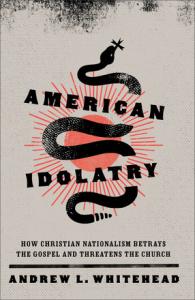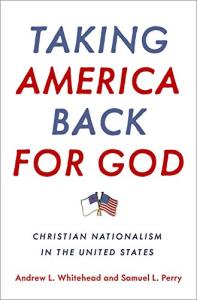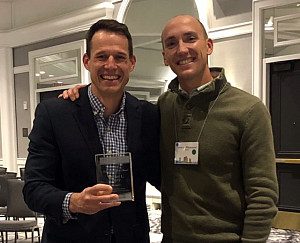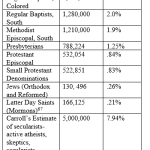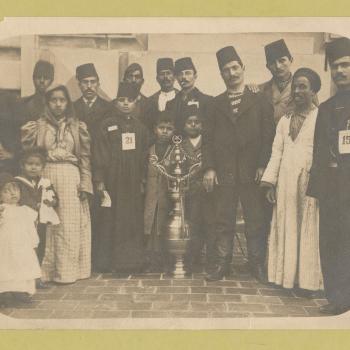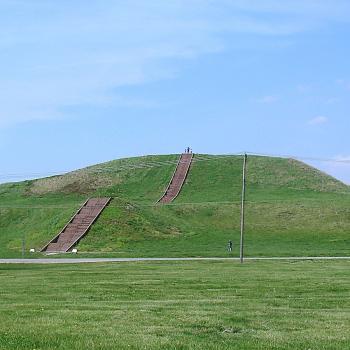Last month I had the privilege of talking with Andrew Whitehead, Associate Professor of Sociology at IUPUI and Director of the Association of Religion Data Archives at the Center for the Study of Religion and American Culture. He is award-winning author, most recently of the new book American Idolatry: How Christian Nationalism Betrays the Gospel and Threatens the Church. We had a great conversation about that book, his scholarly interests, and his hope for the American Church which follows below, edited for clarity. Enjoy!
Ansley Quiros: Hey Andrew!
Andrew Whitehead: Hey there!
AQ: Thanks so much for agreeing to be interviewed for the Anxious Bench.
AW: Oh, thanks. Thanks for inviting me on!
AQ: First things first: Congratulations!
AW: Oh, thanks.
AQ: American Idolatry came out, what? Like a week and a half ago? And it’s already on all the lists…!? How do you feel?
AW: Yeah, thanks. It’s been good. It’s been good- busy, like doing interviews and stuff.
AQ: Yes, well thank you for doing this one. To start: could just tell the readers about yourself? Your background, how you got interested in sociology and particularly the sociology of religion, just who you are.
AW: Definitely. Yeah. So I guess part of my interest in sociology is– you know, growing up religious– just trying to understand why people do what they do. I’ve always been drawn to social sciences and trying to understand why people are the way they are and do what they do. I was a psychology major in undergrad and a sociology minor. But then going to grad school is when I made the switch to sociology. I just found the explanations of human behavior and the importance of context and the importance of the groups we’re a part of and our social location found that more compelling in a lot of ways. And so yeah, that was kind of where I started. And then growing up in a very religious area, I was very active in a white evangelical mega church growing up in middle and high school and just interested in religion and how it operates, what it means. And so that’s what pushed me after undergrad to then go to grad school, wanting to continue to be a student. So you have to get a Ph.D. to do that. So yeah, that’s kind of the quick kind of version of the scholarly aspect, or what pushed me there.
AQ: I should know this– I know your work with Sam [Dr. Samuel Perry] on Christian Nationalism came a bit later, but–What was your dissertation on at Baylor?
AW: Yeah. So my dissertation was on gender and sexuality. And so it really was using survey data to look at individual attitudes, and then also how organizations were responding. A lot of it at that time was in and around attitudes towards same-sex marriage, because it wasn’t yet legal in the US. And then how organizations were responding to Gay and Lesbian people in their congregations–whether they could lead or worship there, that type of thing. So it was an individual organizational analysis of gender and sexuality in American religion.
AQ: Yeah. And it’s different, obviously, than what y’all are working on now, but I can see throughlines of trying to figure out these largely extra-Biblical patterns for inclusion and exclusion, that denominations and organizations and other sort of entities impose on churches. But kind of unevenly–those lines run pretty unevenly.
AW: Yeah, for sure. Yeah, I really like that. It’s who we are, who we’re not, who can belong, who can’t, those types of things.
AQ: And I know we’ll get to that because racism and xenophobia are two of the driving forces that you identify in Christian nationalism. But I guess we should start with the book! The book is American Idolatry: How Christian Nationalism Betrays the Gospel and Threatens the Church. And the argument is sort of in the title. But if you could, tell us the argument of this new book.
AW: Yeah. So with this book–building off of the research that I’ve been a part of and taking it a step further— moving beyond that empirical evidence to make a normative claim and I recognize that, and I’m up front about it. So the central argument is you know, if we understand the gospel–and I have to define that in the book, too–as, and I point to Jesus’ first recorded sermon, as some people call it, where he goes into the synagogue and quotes from Isaiah and says that, ‘today this prophecy has been fulfilled’ in their hearing, talking about freedom for the prisoner, and for the poor, and the oppressed, and the blind. And so, if we understand the Gospel as not just something that’s overly spiritualized—because, growing up, I would have been taught well, he’s talking about the spiritually oppressed or the spiritually poor, the spiritually blind. I think that theology– there’s, you know, historical evidence as we trace it–that that theology was kind of really created to help kind of blind us to the embodied inequality that’s around us, or at least allow white Americans to privilege themselves. But if we read Jesus’ words, maybe even literally like some would say they read the Bible, he’s talking about the literal poor or oppressed, and when he prays that God’s kingdom would come here on Earth. It isn’t just something that we’re thinking about in the future.
So if we define the gospel that way, that it isn’t just some spiritual future state, but that it’s an embodied reality here and now and that Jesus has something to say with how we relate to one another, the systems we’re a part of, the effects of sin– both interpersonally, but then, again, in society. Then, we can take the evidence that social science hands us about how Christian nationalism pushes us to oppress, to ignore marginalization, ignore the systems that are crushing those on the margins. And we can see that it not only limits us from fulfilling what Jesus said He came to do and told us to do as Jesus-followers, but in many ways, it outright opposes that. It keeps us from actually trying to work to heal the blind, and free the oppressed, and all of those things. Essentially, to lift up those on the margins, locate ourselves there, listen to them, try to overturn those systems that are crushing them –all of those things. So that’s how I understand it to betray the gospel: that it keeps us from being able to do that.
AQ: Yeah, I love that. You’re taking two things that you care a lot about– the gospel, this call of Jesus which you’re taking seriously and then social science research—and melding them together. The perceived audience of the book is different than especially Sam’s and your Taking America Back for God. So, how do you see those works in conversation with each other? Like, were you self conscious that that book was so influential, which, of course, it was, and popular amongst academics, definitely broke through to our mainstream conversation? Did you feel like, ‘Oh, I needed to tailor this specifically to Christian readers’? How did you make that switch? And then what are the biggest differences in those two books?
AW: You know, it really began, because Brazos and specifically Katelyn Beaty at Brazos, reached out, and asked, ‘Would you consider writing something to pastors? A Christian audience?’ And I first said, ‘No,’ because I’m not a pastor. I don’t have training there, and honestly, the challenges they face, I’m just in awe. Like, what do I have to tell them? But then as we talked more and had different conversations around it, I realized, too, that I’m also on this journey, personally.
It [the book] could be taking what I’ve learned, or what I see within the fields of social science and history, the stuff that I’m reading, that’s helped me see the world differently. But then, to my personal faith journey– having kind of grown up with this as the taken for granted reality, that America is a Christian nation, and good Americans are Christians and Christians are good Americans– and walking out of that and just sharing that. Perhaps it could serve people on their journeys wherever they might find themselves. And so that was what took me there.
And really, I could point to a paragraph, or maybe two paragraphs, in Taking America Back for God in the conclusion where the seeds of this book really planted right there where we wrote how Christian nationalism threatens Christianity. The verse in Colossians 2:8: “See to it that no one takes you captive through hollow and deceptive philosophy, which depends on human tradition and the basic principles of this world, rather than on Christ.” Colossians is one of my favorite books, and that verse always has stuck out to me in thinking about Christian nationalism. It really is a system and a philosophy centered on human principles–this idea of power, that we have to control, we have to dominate, ee have to protect ourselves through fomenting fear and threat, or through violence protecting those boundaries– those different idols of Christian nationalism, that I call them.
And so out of those two paragraphs, and then talking with the editor at Brazos, that’s what really pushed me to take a stab at it. And and I guess, too, like there’s a part where this book really is written to a particular audience. I want to speak to Christians, and so I’ll use that language and that understanding to try and speak to them, which moves me beyond the norms of academia and social science, for sure. Which, you know, there’s part of me that’s scared about doing that. But you know, too, I think I want to be clear which side I’m on right at this moment, in this point in time. So this one is different. There are no figures in it at all. There are no tables anywhere. All words, but it really does bring in that personal journey at points, too, to help show that we’re all on this journey together. That people can locate themselves in me or with me, where I point out things I believed were wrong, or, I think, betraying the gospel.
AQ: Yeah. And you point out power, fear, violence– these idols. But you do so in a way that recognizes that we’re all susceptible to those impulses. And the posture that you’re taking in writing this book is not wielding those things over and against Christian Nationalists. So there is a way that you’re arguing for the gospel, and also, through the writing of the book itself, embodying a posture of humility and of this other way, this gospel way, of confidence and openness. It’s hard to do that. But I do think the way that you’ve written the book is also supporting the argument of the book.
AW: Oh, wow. That’s wonderful. Thank you, that’s so encouraging.
AQ: There’s an impulse to be like, ‘No! Y’all are being violent! And afraid! And we are kicking you out!’ Which is of course using those old tools. That’s a temptation for all kinds of pacifist movements and protest movements. It’s very hard to develop praxes of change that don’t use those same tactics. And you have to be patient.
AW: I had a friend read an earlier draft, and she was like, ‘well, you know, this part kind of reads like a twitter thread,’ and I don’t like it, the tone just isn’t there. So I was like, ‘Okay.’ It really is this balance of like trying to figure out the arm around the shoulder, let’s walk together type of thing, which is where ultimately I tried to take the tone and put myself. I didn’t wanna point any fingers– just pointing at myself– and then let people impute themselves into my place. So it’s either arm-around, or it was like the flamethrower approach where it’s like ‘I’m coming after everybody!’ I could see where either of those books could be written. There are folks that feel as though this book doesn’t go at people hard enough. So you make choices, and you speak to an audience. I would rather help Accommodators maybe become Resistors. They’re never going to listen if they feel like they’re just being told to be ashamed of wherever they’re at, and I don’t know that we need to be ashamed. I think if you’ve heard and thought about it, and then you just choose to keep embracing it, then that’s not great. But if this is the first you’re coming to it, and people are exploring– we’re all at different points of our journey. At some point, I was embracing it, too. And so let’s just journey together and explore these questions. So yeah, it’s just super encouraging that you said that. So, thank you.
AQ: Yeah, the people who are dug in–you’re not going to convince them anyway. And so, this is a question of audience. Evangelicals, who may be accommodating Christian nationalism or supporting it– even unconsciously, like, they’ve never thought about the fact that there’s an American flag up in the front of the church, they’ve never thought about their responses to threats to the Republican party as being threats on Christianity– they’ve just not made those connections. So what do you want the American church, and specifically evangelicals to take from the book? It’s an invitation to come and see, so what do you want them to see?
AW: What I would really love them to see is that we can be grateful for the historical accident, for most of us, of being born here or making our way here. There are obviously good things about being a citizen here.
But a part of that, too, is to reckon deeply with a lot of the injustice that we’ve been complicit in and maybe didn’t perform, but have benefited from throughout history. Or, even if we don’t maybe directly benefit from it, that others are still perpetually harmed by it. And so, now, how can we do better for them? How can we ensure that everybody has access to the wonderful things about being a citizen here, access to flourishing. If we’re praying for the Kingdom of God to come here on earth then I think that means we need to listen and learn from those who have been marginalized, are being crushed, are being blocked from access to flourishing.
And then taking what we have to help change that situation for them. Whether it’s changing a system that is placing them on the outside, keeping them from being able to do the things that we might take for granted. So that is my hope for white Evangelicals–that we can sit and listen and learn from those. It’s easy for us to say, ‘okay, just wait for Kingdom of God sometime in the future, and we can wait till then,’ because things are pretty good for us now. But for those where it isn’t very good right now, the gospel should mean something more, it should free them and bring some of that freedom that Jesus was talking about.
AQ: Yeah, I actually have a question about it, though. Two of those things that you’re really pressing against are racism and nativism/xenophobia. And I’m curious: in your conversations with people, are they more resistant–and this may be one answer for one and another for the other, that’s my hunch– but, are people more resistant to arguments against racism and xenophobia in the present or are they more resistant to being confronted with evidence in the past–this idea that they’ve benefited from whiteness?
AW: The latter.
AQ: The latter. Yeah, it’s interesting, like, that already happened. My hunch is that on race people are more resistant to it historically. But I wonder, with xenophobia. I don’t see anybody really losing it about the National Origins Quota Act, for example– they may be like, ‘yeah, okay, not great.’ But now, they’re like, ‘no, we gotta secure that border.’ So I wonder if xenophobia and racism are different in that way?
AW: I think you’re right on. I think that totally makes sense to me. It really resonates.
I was writing at one point, and Sam gave me a critique–which I think he was right [about]–where I was being anachronistic. I was looking back to my past and thinking about how we were afraid of immigrants, and he’s like, ‘No, that was pretty recent. For people in the 1980s, it was not a thing, like Reagan was pretty pro-[immigrant].’ And I was like, ‘You’re right.’ We basically just ignored it. We didn’t hate it. But now it’s much more on the front. So I think there is a flip– much more worried about contemporary immigration, and couldn’t care less about the past, and more afraid of talking about historic slavery or anti-black bias. Yeah.
AQ: Yeah. I haven’t heard a lot of people talk about that, those two issues. And I think it’s smart for you to highlight those, too, because they should be talked about more together. Both in terms of whiteness but also in terms of the 1960s. The Civil Rights Acts is 1964, Voting Rights Act is 1965, the Immigration Act [Hart-Celler] is 1965. It happens at the same time! And it kind of gets overlooked but is absolutely seismic in American race relations and racial history, too, so I’m glad you pointed that out. Which is also the ‘white’ part of white Christian nationalism so important in your work. So thank you for explaining that.
AW: Oh, yeah.
AQ: One thing that I’m curious about. I know you wrote this book at the request of Brazos and you knew what it was going in [to it], but you’ve [also] mentioned editors that you had, or places where you grappled. What’s something that surprised you in the process of researching and writing? Was it your own story, excavating those things from your own life, or something else?
AW: I guess the area that comes to mind at first with this question is more just the meta experience of writing the book. Just writing the book and trying to tell that story and think through how these things are related… putting the pieces together. I think what I found out about myself [too] is just how difficult writing is, no matter what…
As far as within the book, the content of the book, I think the instances and stories of racial violence and xenophobic violence. The chapter on racism, talking about lynching, and just how many Christians were present–or silent. The relocation of indigenous children to these boarding schools and the horrors that took place there. Those are extreme examples, in a sense, but yet so benign [to them] in another. People were all around, and it was happening. [So when people] are like, ‘let’s go back to a more Christian nation,’ I’m like, ‘goodness gracious!’ There were Christians cheering at the lynching of Jesse Washington or Christians running these boarding schools. That marrying of power and privilege to benefit the group– how quickly it can twist our faith. It should scare us. And so, I think, really continuing to wrestle with that.
And how theologies were, were in some sense created to help blind us, or to allow us to remain ignorant to a lot of evil that was perpetrated. That’s what kind of surprised me, too, with this: how much work has to be done to really pull these threads apart because they’ve been so taken for granted.
AQ: Yeah, I love that. And it reminds me of something we talked about at the outset. These social traditions, cultural traditions, and invented theologies end up mixing together in really confusing ways, so that exclusion becomes justified by theology. And the order of events is sometimes different. So, like, was the Doctrine of Discovery invented to justify atrocities? Yes. But then, later, is it later used as a theology that allows other, new things? Also yes. And so it’s hard for us, as historians, and people who study religion to disentangle them because they so often go together. So sometimes people ask, ‘Is Christian nationalism just about power?’ And the answer is yes. But then is it also theological? Also yes, because the Kingdom becomes spiritualized. But we’re literally going to bar human beings from our border because we’re enforcing some spiritual principle that we want to embody, but in other places it’s disembodied. Those are theological decisions that are enforced culturally and socially. Which, I think, is really what your work is speaking to.
AW: No, totally. Yeah. I totally agree with that. It’s such a good point, because it’s like Romans 13:1 when we’re in power but when we’re not, ‘these are two kingdoms, baby, you cannot submit to these authorities’ or Chronicles, ‘heal our land.’
AQ: That one!
AW: Well, that’s literal and that was meant for us. Yeah, the collaborative negotiating and use within this community and communities, negotiating all this stuff. That’s why we do what we do. We find it fascinating to study that and make sense of it. But it is really hard. And that’s the fun part, too. It’s all a conversation we’re a part of, which is great. This book doesn’t solve it, but I hope it helps the audience that it finds. And there’s other great books, so altogether, hopefully, we’re resourcing people. That’s the hope, anyway.
AQ: Well, I think it’s a great book and a great, clear argument and assessment that’s also very kind at the same time. It’s a way for you, in this particular moment that’s so full of those conversations, for you to bear witness to what I think is a better way. So thank you for writing it.
AW: Oh, yeah, thanks for reading it and writing this interview, and all of that. I really do appreciate it. It means the world. That smart people take the time, spend any time, on the book is just such a gift.
AQ: Well, I’m grateful as a reader, as an academic, but then also as a Christian, to have this as a resource. Thank you Andrew!
If you, like me, can’t get enough of Andrew’s brilliant insights, you’re in luck! He has a new podcast exploring Christian nationalism, American Idols, and also a new-ish substack, where you can follow along as we all apparently transition off of Twitter/X. Check them out! And let us know what you thought of our conversation on social media or in the comments.



